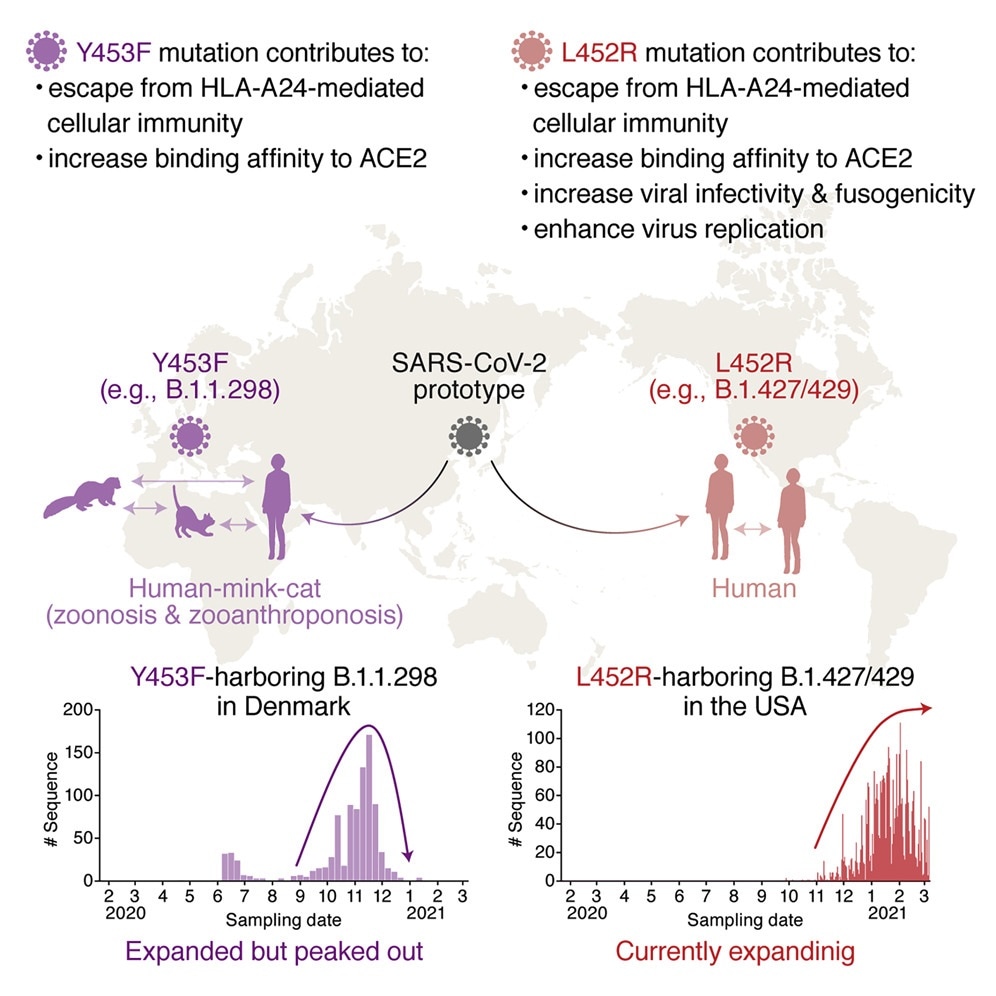Led by Kumamoto and Tokyo Universities (Japan), an international research team has demonstrated that the L452R mutation of the SARS-CoV-2 spike protein, common to two mutant strains (Delta and Epsilon), plays a role in cellular immunity evasion through the human leukocyte antigen (HLA) A24, increasing viral infectivity.

SARS-CoV-2 Y453F and L452R variants contribute to evasion from cellular immunity and the L452R variant also increases viral infectivity. Image Credit: Graphical abstract from Motozono, C. et al., Cell Host & Microbe, 2021.
HLA-A24 is one of the most prevalent HLA-class I alleles, specifically in East/Southeast Asian populations, which could make them specifically susceptible to coronavirus variants with this mutation.
As of June 2021, the current novel coronavirus (COVID-19 or SARS-CoV-2) pandemic has infected more than 150 million people and killed more than 3.5 million across the globe. Vaccination campaigns across the world are now underway. However, there are many more unknowns, such as the principles of viral replication, the principles of infection pathogenesis, and the relationship between epidemic dynamics and immune evasion.
Acquired immunity can be classified widely into humoral immunity adjudicated by neutralizing antibodies and cellular immunity adjudicated by killer and helper T cells. SARS-CoV-2 “variants of concern,” like the Alpha and Beta variants, have been investigated worldwide for the potential of humoral immunity evasion. But cellular immunity evasion has not been reported.
As part of this study, the researchers first employed immunological experiments to show that an antigen extracted from the SARS-CoV-2 spike protein is strongly identified by HLA-A24-restricted cellular immunity, usually found in Japanese people.
Then, the researchers conducted a large-scale (>750,000) sequence analysis of SARS-CoV-2 strains and identified various important mutations in the spike protein region typically recognized by HLA-A24.
The significant mutations are the Y453F spike mutations identified in strain B.1.1.298, which was widespread in Denmark in 2020, and the L452R mutation in B.1.427/429 and B.1.617 (generally called the Epsilon and Delta variants, respectively) that are now spreading across the globe. More immunological experiments showed that these mutations evade HLA-A24 cellular immunity.
The team considers that this is the first time a “variant of concern” has been shown to escape cellular immunity.
The L452R and Y453F mutations were identified in the receptor-binding domain of the SARS-CoV-2 spike protein, vital for gaining access into host cells. Thus, researchers investigated the effects of such mutations on the replication and infection efficiency of the virus. They identified that the L452R mutation improves its membrane fusion activity, viral replication, and infectivity.
The L452R mutation is a hallmark of the Delta variant that is currently spreading worldwide, and in Japan, about 60% of the population have HLA-A24, which is responsible for cellular immunity. The L452R mutation not only evades the HLA-A24 cellular immunity but can also enhance the infectivity of the virus.”
Dr Chihiro Motozono, Leader of Study’s Immunology, Kumamoto University
“We have been carefully investigating the immune response against emerging SARS-CoV-2 variants in real-time to monitor how the mutations affect human immunity and viral infectivity,” added Dr Motozono.
Source:
Journal reference:
Motozono, C., et al. (2021) SARS-CoV-2 spike L452R variant evades cellular immunity and increases infectivity. Cell Host & Microbe. doi.org/10.1016/j.chom.2021.06.006.